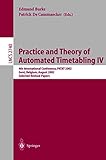Practice and Theory of Automated Timetabling IV [electronic resource] : 4th International Conference, PATAT 2002, Gent, Belgium, August 21-23, 2002. Selected Revised Papers / edited by Edmund Burke, Patrick Causmaecker.
Material type: TextSeries: Lecture Notes in Computer Science ; 2740Publisher: Berlin, Heidelberg : Springer Berlin Heidelberg, 2003Description: XII, 368 p. online resourceContent type: text Media type: computer Carrier type: online resourceISBN: 9783540451570Subject(s): Computer science | Computer software | Electronic data processing | Computational complexity | Artificial intelligence | Information systems | Computer Science | Algorithm Analysis and Problem Complexity | Numeric Computing | Discrete Mathematics in Computer Science | Artificial Intelligence (incl. Robotics) | Computer Appl. in Administrative Data Processing | Operations Research/Decision TheoryAdditional physical formats: Printed edition:: No titleDDC classification: 005.1 LOC classification: QA76.9.A43Online resources: Click here to access online
TextSeries: Lecture Notes in Computer Science ; 2740Publisher: Berlin, Heidelberg : Springer Berlin Heidelberg, 2003Description: XII, 368 p. online resourceContent type: text Media type: computer Carrier type: online resourceISBN: 9783540451570Subject(s): Computer science | Computer software | Electronic data processing | Computational complexity | Artificial intelligence | Information systems | Computer Science | Algorithm Analysis and Problem Complexity | Numeric Computing | Discrete Mathematics in Computer Science | Artificial Intelligence (incl. Robotics) | Computer Appl. in Administrative Data Processing | Operations Research/Decision TheoryAdditional physical formats: Printed edition:: No titleDDC classification: 005.1 LOC classification: QA76.9.A43Online resources: Click here to access online  E-BOOKS
E-BOOKS
| Current library | Home library | Call number | Materials specified | URL | Status | Date due | Barcode |
|---|---|---|---|---|---|---|---|
| IMSc Library | IMSc Library | Link to resource | Available | EBK5218 |
General Issues -- Constraints of Availability in Timetabling and Scheduling -- A Standard Framework for Timetabling Problems -- Solving Dynamic Resource Constraint Project Scheduling Problems Using New Constraint Programming Tools -- Sports Timetabling -- Integer and Constraint Programming Approaches for Round-Robin Tournament Scheduling -- Characterizing Feasible Pattern Sets with a Minimum Number of Breaks -- Solving the Travelling Tournament Problem: A Combined Integer Programming and Constraint Programming Approach -- Employee Timetabling -- Personnel Scheduling in Laboratories -- Scheduling Doctors for Clinical Training Unit Rounds Using Tabu Optimization -- Relaxation of Coverage Constraints in Hospital Personnel Rostering -- Storing and Adapting Repair Experiences in Employee Rostering -- Scheduling Agents – Distributed Timetabling Problems -- Examination Timetabling -- A Multiobjective Optimisation Technique for Exam Timetabling Based on Trajectories -- Enhancing Timetable Solutions with Local Search Methods -- A Hybrid Algorithm for the Examination Timetabling Problem -- GRASPing the Examination Scheduling Problem -- University Course and School Timetabling -- Search Strategy for Constraint-Based Class–Teacher Timetabling -- Multi-neighbourhood Local Search with Application to Course Timetabling -- Knowledge Discovery in a Hyper-heuristic for Course Timetabling Using Case-Based Reasoning -- Generalizing Bipartite Edge Colouring to Solve Real Instances of the Timetabling Problem -- Flow Formulations for the Student Scheduling Problem -- University Course Timetabling with Soft Constraints -- A Comparison of the Performance of Different Metaheuristics on the Timetabling Problem.
Thisvolumecontainsaselectionofpapersfromthe4thInternationalConference on the Practice and Theory of Automated Timetabling (PATAT 2002) held in Gent, August 21–23, 2002. Since the ?rst conference in Edinburgh in 1995, the range of timetabling applications at the conferences has become broader and more diverse. In the s- ected papers volume from the 1995 conference, there were just two contributions (out of 22) which did not speci?cally address school and university timetabling. In the selected papers volume from the 1997 conference in Toronto, the number of papers which tackled non-educational problems increased. Two of the papers addressed more than one timetabling application. In both of these papers, educational applications were considered in addition to other applications. A further three papers were concerned with non-educational applications. The conference steering and programme committees have worked hard to attract a wide range of timetabling applications. In the conference held in Konstanz in 2000, the diversi?cation of timetabling problems increased signi?cantly. Of the 21 selected papers in the postconference volume, just 13 were speci?cally concerned with educational timetabling. In the previous volumes, the papers had been sectioned according to solution technique. In the Konstanz volume the papers were classi?ed according to application domains. One section of the volume was entitled “Employee Timetabling,” while sports timetabling, air?eet scheduling, and general software architectures for timetabling were also represented. In the present volume, more than one-third of the 21 papers discuss problems in application areas other than academic and educational ones. Sports timetabling and hospital timetabling are particularly well represented.


There are no comments on this title.